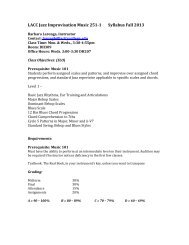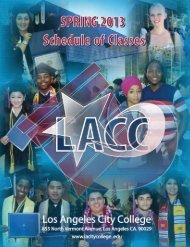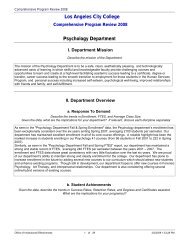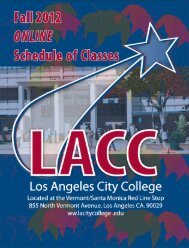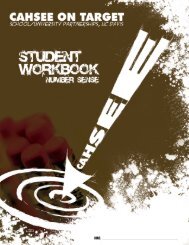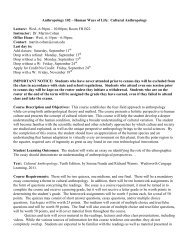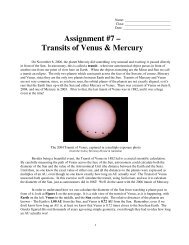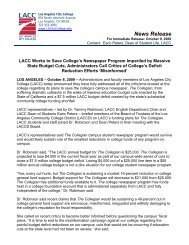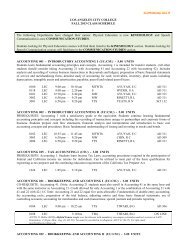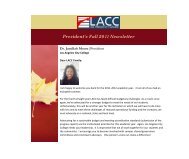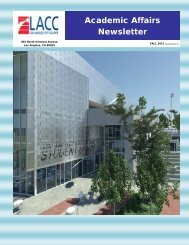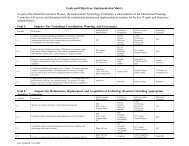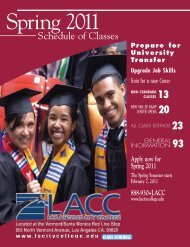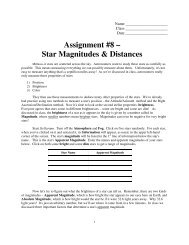LACC Vision & Mission Statements As Approved By - Los Angeles ...
LACC Vision & Mission Statements As Approved By - Los Angeles ...
LACC Vision & Mission Statements As Approved By - Los Angeles ...
You also want an ePaper? Increase the reach of your titles
YUMPU automatically turns print PDFs into web optimized ePapers that Google loves.
LOS ANGELES CITY COLLEGE 80TH ANNIVERSARY CATALOG 2008-2009<br />
Electronics 156 ........................................................................................ 4<br />
Electronics 81 .......................................................................................... 1<br />
Electronics 82 .......................................................................................... 1<br />
Electronics 87 .......................................................................................... 1<br />
Electronics 95 .......................................................................................... 2<br />
Total Units ............................................................................................. 38<br />
COURSE DESCRIPTIONS<br />
NOTE: Not every class is offered each semester. Refer to the current class<br />
schedule for current class offerings.<br />
PREREQUISITES: Specified prerequisites must be completed with a satisfactory<br />
grade or equivalent.<br />
ELECTRONICS 2<br />
Introduction to Electronics and Computer Technology<br />
3 UNITS - (CSU)<br />
Lecture 1 hour. Laboratory 3 hours.<br />
An exploratory course for students interested in electronics and computer<br />
technology which will and computer technology, which will cover the following<br />
topics: careers in electronics, computer technology, circuits, and assembly<br />
techniques, including soldering testing and troubleshooting. Students<br />
will build a useful electronic product.<br />
ELECTRONICS 4<br />
Fundamentals of Electronics I<br />
4 UNITS - (CSU)<br />
Co-requisite: Electronics 10.<br />
Advisory: English 21/73 or equivalent.<br />
Lecture 3 hours. Laboratory 3 hours.<br />
This course presents the concepts of direct current circuits, including the<br />
basics of electricity, series parallel circuits, meters, batteries, resistors, and<br />
magnetism. The laboratory emphasizes the development of skills in the analysis<br />
of circuits and the use of test equipment.<br />
ELECTRONICS 6<br />
Fundamentals of Electronics II<br />
4 UNITS - (CSU)<br />
Prerequisite: Electronics 4 with satisfactory grade or better or equivalent.<br />
Co-requisite: Electronics 12.<br />
Lecture 3 hours. Laboratory 3 hours.<br />
This course gives a detailed study of alternating current theory and applications.<br />
The topics include reactance, impedance, resonance, transformers, coupling,<br />
filters, bandpass and time constants. The laboratory emphasizes skills in<br />
the use of test equipment in AC circuits.<br />
ELECTRONICS 8<br />
Electron Devices<br />
4 UNITS - (CSU)<br />
Prerequisite: Electronics 4 with satisfactory grade or better or equivalent.<br />
Lecture 3 hours. Laboratory 3 hours.<br />
Presents the nature and operation of solid-state devices including diodes,<br />
transistors, and field effect devices. Includes simple circuit applications.<br />
ELECTRONICS 10<br />
Mathematics of Electronics I<br />
3 UNITS - (CSU)<br />
Lecture 3 hours.<br />
Introduces method and techniques for the solution of basic DC circuit problems.<br />
Includes the study of algebraic operations, simple linear equations,<br />
algebraic fractions, ratio and percent, graphing, and use of the electronic<br />
calculator.<br />
- 107 -<br />
ELECTRONICS 12<br />
Mathematics of Electronics II<br />
3 UNITS - (CSU)<br />
Perquisite: Electronics 10 with satisfactory grade or better or equivalent.<br />
Lecture 3 hours.<br />
This course develops a proficiency in the use of algebra, trigonometry, complex<br />
numbers, logarithms and determinants, as needed in electronics calculations.<br />
The techniques of network solutions are emphasized including<br />
Kirchhoff’s and Ohm’s laws, Thevenin’s and Norton’s theorems.<br />
ELECTRONICS 20<br />
Electronics Circuits I<br />
4 UNITS – (CSU)<br />
Prerequisite: Electronics 6 and 8 with satisfactory grades or better or<br />
equivalent<br />
Lecture 3 hours. Laboratory 3 hours.<br />
Applications of electronic devices such as diodes, junction and field effect<br />
transistors, and silicon controlled rectifiers to signal and power amplifiers,<br />
multistage amplifiers, differential amplifiers, and special functions. Circuit<br />
analysis problems are solved in the laboratory and using computer simulations.<br />
ELECTRONICS 22<br />
Electronics Circuits II<br />
4 UNITS – (CSU)<br />
Prerequisite: Electronics 6 and 8 with satisfactory grades or equivalent<br />
Lecture 3 hours. Laboratory 3 hours.<br />
Introduces the concepts of electronics systems by examining details of AM<br />
and FM radio communications, circuits, and theory. Includes radio frequency<br />
propagation, transmission line theory, antenna theory, and generation and<br />
detection of radio waves. The techniques of scientific trouble shooting are<br />
included.<br />
ELECTRONICS 24<br />
Electronics Circuits III<br />
4 UNITS – (CSU)<br />
Prerequisite: Electronics 20 and 22 with satisfactory grades or better or<br />
equivalent.<br />
Lecture 3 hours. Laboratory 3 hours.<br />
Extends the study of the systems concept into more sophisticated electronics,<br />
including video and television systems. Includes transmission and broadcast<br />
of television signals, and digital-analog hybrid systems for audio and<br />
video processing and display. The laboratory emphasizes analysis and trouble<br />
shooting with the oscilloscope.<br />
ELECTRONICS 48<br />
Integrated Circuits<br />
4 UNITS – (CSU)<br />
Prerequisite: Electronics 20 with a satisfactory grade or equivalent<br />
Lecture 3 hours. Laboratory 3 hours.<br />
Applications of the integrated circuit operational amplifier such as amplifiers,<br />
active filters, and oscillators. Includes analog-digital and digital-analog<br />
conversion, digital-analog systems integration, and use of operational amplifiers<br />
in robotics and environmental sensing.<br />
ELECTRONICS 81<br />
Projects Laboratory<br />
1 UNIT – (RPT 3) (A)<br />
Course designed to give electronics and computer technology students experience<br />
in the following techniques: Identification of devices and components,<br />
soldering and desoldering, printed circuit assembling, electronics drafting,<br />
and chassis fabrication.



